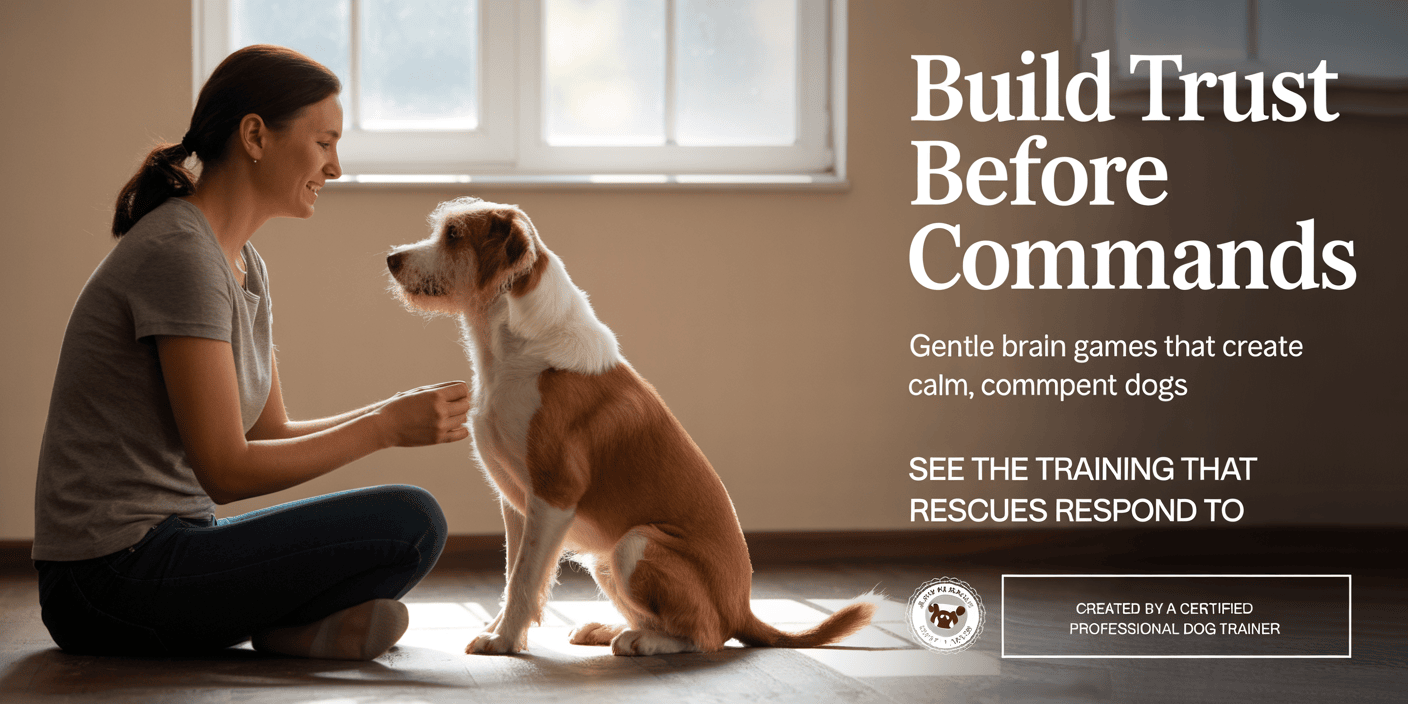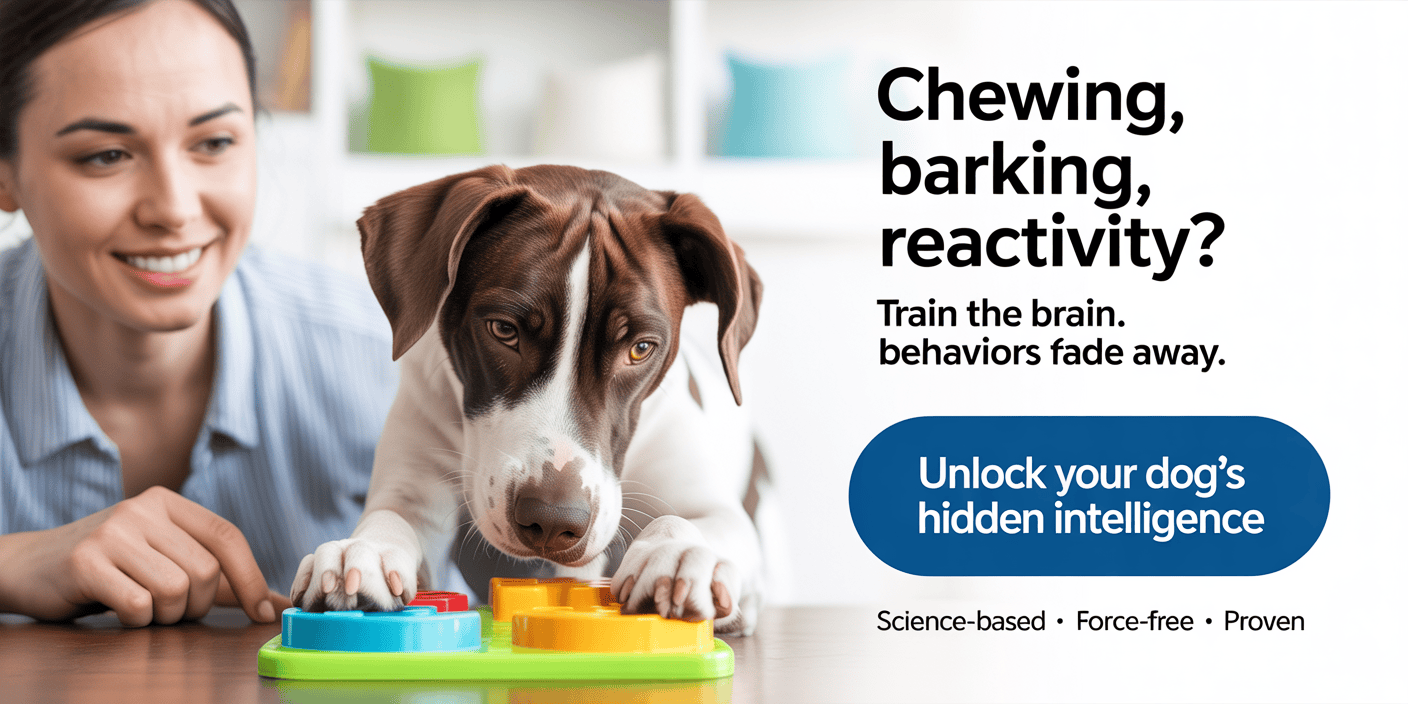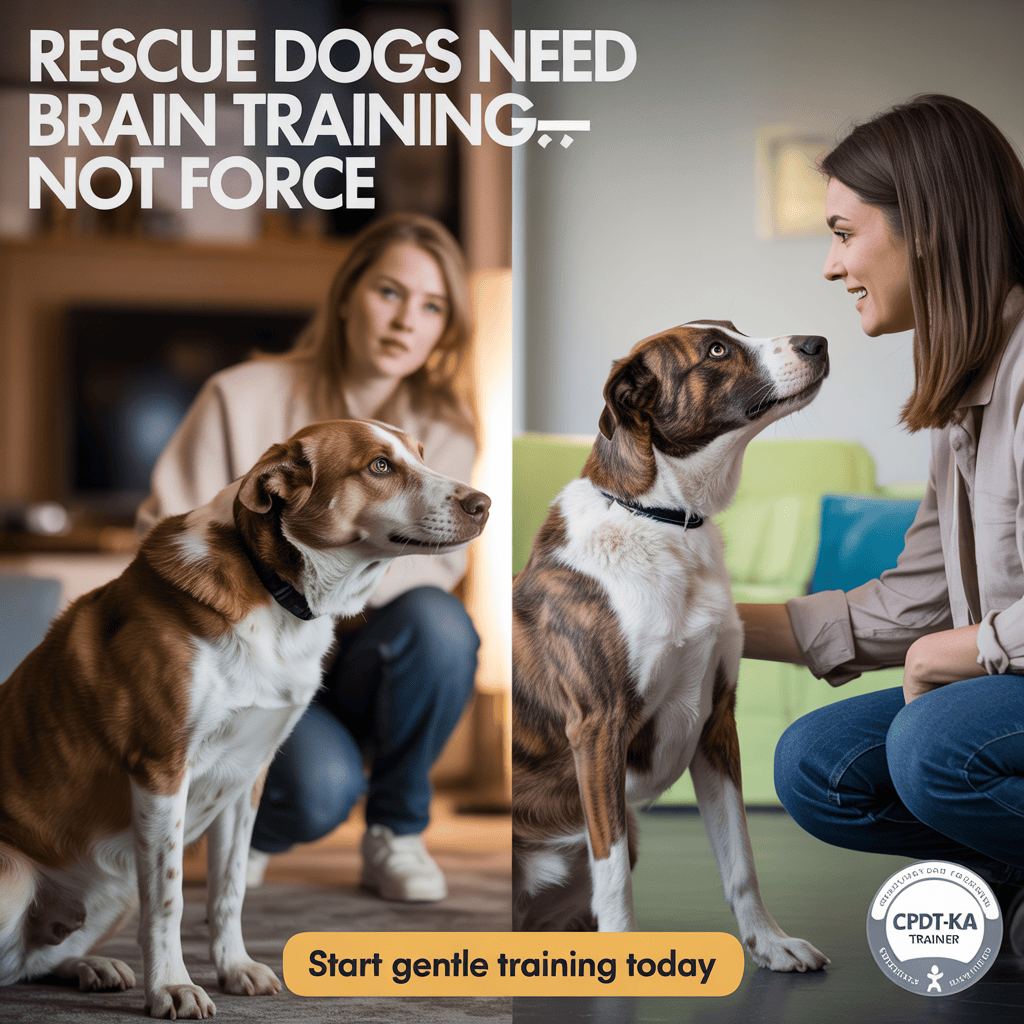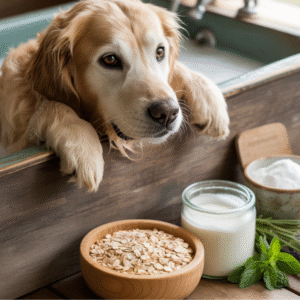Learning how to socialize a rescue dog is a crucial step in helping your new furry friend adjust to their forever home. When you bring a rescue dog into your family, they often come with fears and uncertainties from their past experiences.
Our step-by-step guide on how to socialize a rescue dog will help you transform your nervous pup into a confident, happy companion. Whether your rescue is shy, fearful, or just needs some extra guidance, these proven techniques will make the journey easier for both you and your four-legged friend.
By following our expert tips, you’ll create a strong bond while helping your rescue dog discover that the world can be a safe and exciting place to explore.
Bringing a rescue dog into your home is a rewarding experience. But it can also be challenging. These dogs often face uncertainty, fear, and even trauma. As you start this journey, socialising your rescue dog is a key step.
The best time for socialisation is between three weeks and four months old. But, for rescue dogs who missed this window, it’s harder. Still, with patience, persistence, and the right approach, you can help your dog feel confident and well-adjusted.
Key Takeaways
- Socialisation is crucial for helping rescue dogs overcome fear, anxiety, and aggression.
- Understanding your rescue dog’s background, including any past trauma or neglect, is key to tailoring your socialisation approach.
- Start slowly and gradually, creating a safe and secure environment for your dog to explore new experiences.
- Positive reinforcement training is essential for building trust and confidence.
- Exposing your rescue dog to diverse situations and people, at a comfortable pace, can help them become more adaptable and resilient.
Understanding the why to socialize a Rescue Dog
Socialising a rescue dog is key to their happiness in their new home. The benefits of dog socialisation include overcoming fear and anxiety, addressing aggression, building trust, and boosting confidence.
Why Socialisation is Crucial
Many rescue dogs have faced hard times, leading to fear, anxiety, and aggression. Proper socialisation is key to helping these dogs overcome these challenges and become well-adjusted, adaptable companions. Socialisation between 7 and 11 weeks is vital for their social skills. But many shelter dogs are not fully vaccinated until 14 weeks, making rehoming tough.
Overcoming Fear, Anxiety, and Aggression
Rescue dogs with poor socialisation can be “Tarzans” or “Garbos”. “Tarzans” are too excited, while “Garbos” are fearful or snappy around others. Gradual exposure to new situations and people helps them trust and become less reactive.
Building Trust and Confidence
Building trust and confidence in a rescue dog takes time and patience. By starting slowly, allowing the dog to control the pace and level of interaction, and rewarding positive behaviour, you can help the dog feel more secure and comfortable in their new environment. As trust and confidence grow, the dog will become more responsive to training and more open to new experiences, setting them up for success in their forever home.
Socialisation is crucial for the overall well-being and successful integration of rescue dogs into their new homes. By helping them overcome fear, anxiety, and aggression and building trust and confidence, you can set them up for a happy and fulfilling life with their new family.
Considering the Background of Your Rescue Dog
Understanding your rescue dog’s background is key to socialising them. Many have faced trauma or neglect. This can affect their behaviour and trust. Knowing their history helps you tailor socialisation to meet their needs and help them overcome past fears and anxieties.
Previous Trauma or Neglect
Rescue dogs often come from tough backgrounds, missing out on socialisation. This can lead to fear, aggression, or anxiety. By acknowledging their past, you can create a supportive space for their socialisation.
Lack of Exposure to Different Environments
Rescue dogs may also lack exposure to various environments and social situations. This can cause fear, anxiety, and aggression in new situations. Gradually introducing them to new places, people, and things helps them become confident and adaptable.
Rescue dogs need time and patience to adjust. It’s important to respect their fears and boundaries during socialisation. With the right support, they can overcome their past and become confident, well-socialized companions.
Starting Slowly and Gradually

When socialising a rescue dog, it’s important to start slow. This makes a safe space for the dog to feel comfortable. You might set up special areas in your home for the dog to relax in. Also, introduce new people and situations slowly, so the dog can handle it.
Letting the dog control how close they want to be helps build trust. This trust is key to successful socialisation.
Establishing a Safe and Secure Environment
A safe and secure environment is the basis for socialising a rescue dog. Create cosy spots in your home, like a crate or a special resting area. These spots help the dog feel safe and in control.
Introducing New People and Situations at a Comfortable Pace
Introduce new people and situations slowly, at a pace the dog is okay with. Start with short, positive interactions with people the dog knows. Then, gradually make these interactions longer and more frequent as the dog gets more relaxed.
It’s important to reward the dog for calm and positive behaviour. This helps the dog learn that new things are good.
The secret to socialising a rescue dog is to go slow and make it comfortable. By slowly introducing new people and situations, you help the dog feel secure. This builds trust and makes them a well-adjusted companion.
Remember, patience and consistency are key. It may take time for the dog to feel safe and trusting in their new home.
Positive Reinforcement Training
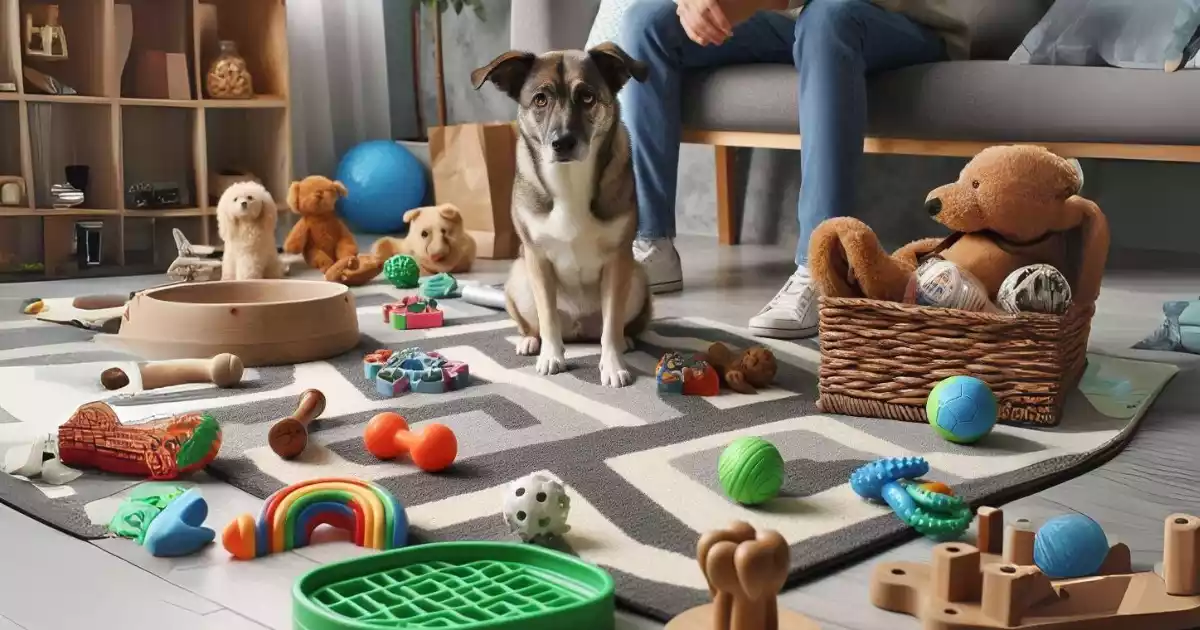
Positive reinforcement training is a kind and effective way to socialize a rescue dog. It rewards good behaviours, like calmness and confidence around people or other animals. This method helps build trust and a strong bond between the dog and their owner, making socialisation fun and successful for both.
Rewarding Desired Behaviours
Using positive reinforcement, like treats and praise, is better than punishment. It encourages good behaviours and helps with socialisation. Food is a common reward for dogs and cats, as they love to work for it. Rewarding the behaviours you want to see helps your rescue dog feel more at ease and confident in new situations.
Consistency and Patience During Training Sessions
Consistent and patient training is crucial for socialising a rescue dog. Setting clear goals, rewarding good behaviour, and staying calm are important. Rescue dogs may need more time and repetition to trust and learn new things, so patience is key. Short sessions are best for both the owner and the pet’s enjoyment, making it fun.
By being consistent and letting the dog learn at their own pace, you help them gain confidence and skills for social situations. Basic training can lead to polite interactions with most people after socialisation, as recommended.
“Positive reinforcement is noted as the most effective and humane way to train animals.”
The principles of behavioural training, especially positive reinforcement, are key to socialising rescue dogs. Karen Pryor’s “Don’t Shoot the Dog!” explains the most effective techniques.
| Positive Reinforcement Training Techniques | Benefits for Rescue Dogs |
|---|---|
| Using treats and gentle praise | Maintaining a calm and supportive demeanour |
| Setting clear training goals | Provides structure and consistency |
| Keeps the process fun for both the dog and the owner | Helps rescue dogs feel safe and secure |
| Short, enjoyable training sessions | Keeps the process fun for both the dog and owner |
Exposing to Various Situations and People
It’s important to slowly introduce a rescue dog to different places and things. This means taking them on walks in new areas, visiting places where pets are welcome, and letting them meet new sights, sounds, and smells. Positively doing this helps the dog feel more confident and less scared or anxious.
Introducing Different Environments and Stimuli
It’s also key to help them get along well with many people. This includes meeting people of all ages, genders, and looks, as well as those wearing different things that might make the dog nervous. By rewarding them for being calm and friendly, you help them feel more at ease and well-adjusted.
Encouraging Interactions with Diverse Individuals
Helping a rescue dog meet different people is vital for their happiness and adjustment. Introducing them to people of all ages, genders, and looks, and those wearing different things, helps them feel more confident in new situations. By rewarding them for being calm and friendly, you build their trust and reduce any fear or anxiety.
Remember, socialising a rescue dog takes time and patience. Slowly introducing them to new things and people, and rewarding them for good behaviour, helps them get over past traumas or lack of socialization. Being consistent and supportive is crucial for helping your rescue dog become a happy and confident friend.
| Socialization Strategies | Benefits |
|---|---|
| Gradually exposing rescue dogs to new environments and stimuli | Builds confidence, reduces fear and anxiety, and enhances adaptability |
| Encouraging positive interactions with diverse individuals | Reinforces calm and confident behaviour, facilitates a successful socialization process |
| Using positive reinforcement during new experiences | Reinforces calm and confident behaviour, facilitates a successful socialisation process |
By using these strategies and creating a supportive space, you can help your rescue dog overcome past challenges. They will become a well-adjusted, confident, and sociable friend.

Addressing Fear and Anxiety
For rescue dogs with fear and anxiety, creating a supportive home is key. It helps them feel safe and calm. Setting up “safe spaces” in the home is a good start. These areas let dogs retreat and relax when needed.
Using calming tools like pheromone diffusers or calming music also helps. These tools can reduce stress and anxiety during socialisation.
Gradual Exposure and Positive Reinforcement
Gradual exposure and positive reinforcement are effective for fearful dogs. Introduce new experiences and people slowly. Reward calm and confident behaviour to help them overcome fears.
This method lets dogs progress at their own speed. It prevents them from feeling overwhelmed or defensive. By linking new experiences with positive outcomes, dogs learn to see them as pleasant, not scary.
“Counter conditioning and desensitization, when done successfully, help fearful dogs feel more comfortable around the source of their fear.”
Most fearful dogs are under-socialized, not abused. Their fears can stem from genetics, upbringing, or past experiences. Dogs may fear things like stairs, leashes, or loud noises without reason.
By supporting them and using gradual exposure with positive reinforcement, you can help. This way, fearful rescue dogs and anxious rescue dogs can overcome their fears and grow in confidence.
How to socialize a rescue dog
Getting professional help is key when socialising a rescue dog. Experts in canine behaviour can offer personalised advice and strategies. They help tackle issues like aggression or anxiety. They create a plan that fits the dog’s unique background and needs, helping them become a confident friend.
Seeking Professional Help
Working with a pro is crucial for socialising a rescue dog. They know how to help adult dogs, which are often more cautious than puppies. They guide you in changing bad habits and introduce your dog to new things slowly.
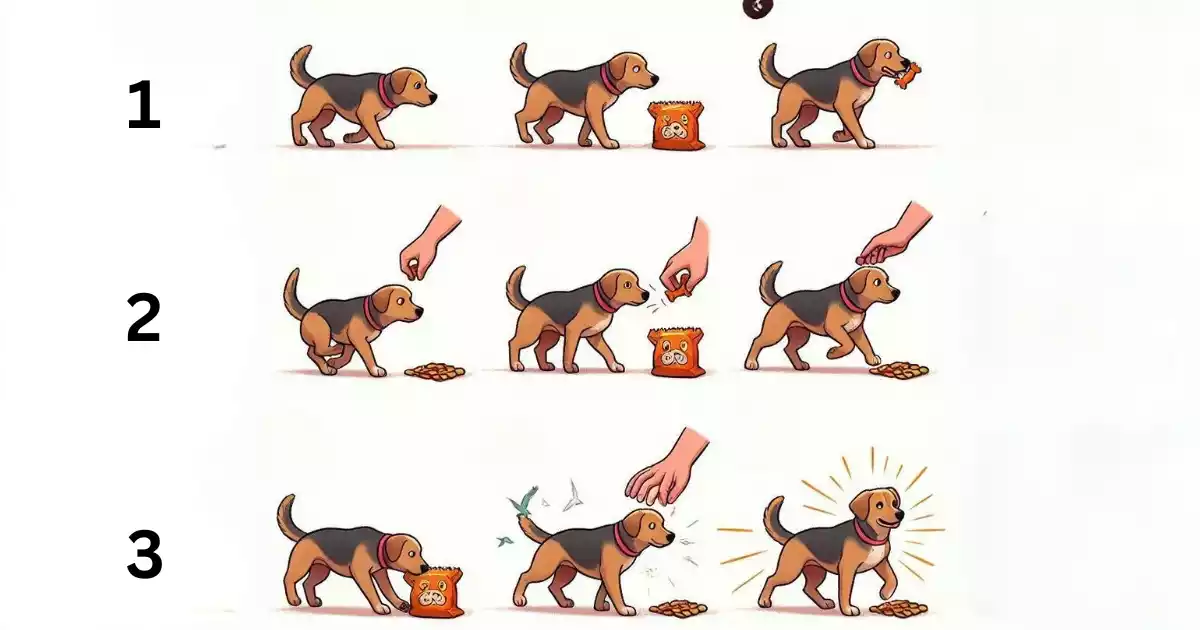
Joining Dog Socialisation Groups
Joining dog socialisation groups is also a great idea. These groups are safe places for dogs to meet others and people, with experienced handlers watching over them. It’s a chance for your dog to get better at socialising and feel more at ease in different places. Plus, you’ll find support from other dog owners who understand what you’re going through.
Getting professional help and joining dog socialisation groups can really help your rescue dog. They offer the support and guidance needed to overcome behavioural issues. This way, your dog can build trust and confidence, making the transition to their new home a success.
Celebrating Progress and Success
Socialising a rescue dog is a journey with many small victories. It’s important to celebrate these moments. They show the dog’s growing confidence and trust. Every small success, like meeting a stranger or exploring a new place, is a big deal. It helps the dog learn and keeps them and their owner excited about the journey.
Acknowledging Small Victories
Rescue dogs often face big challenges, like extreme stress and little positive human contact. Celebrating their small wins helps build trust and keeps them moving forward. This could be when they calmly say hello to someone new or try something new.
Patience and Consistency are Key
Socialising a rescue dog needs a lot of patience and consistency. The journey can have ups and downs, but staying calm and supportive is key. A routine and training schedule make the dog feel safe and confident. This leads to a strong bond with their new family.
Remember, start socialising a puppy around 8 weeks old. Puppy classes for older dogs help with social skills and prevent fear and aggression. Playdates and trips to pet-friendly places are also important. They teach puppies how to play and communicate with other dogs.
As you work with your rescue dog, always celebrate the small wins. Stay patient and consistent. With time and effort, your dog will grow and thrive.
Struggling to Socialize Your Rescue Dog? Start With Their Mind—Not Force
Most rescue dogs aren’t “unsocial”—they’re overwhelmed, anxious, and mentally under-stimulated.
That’s why traditional socialization tips often fail.
Brain Training for Dogs takes a smarter, gentler approach—by unlocking your dog’s hidden intelligence first.
⭐ Why This Program Works for Rescue Dogs:
- 🧠 Builds confidence & calmness through mental stimulation
- 🚫 Eliminates fear-based behaviours like reactivity, barking, and avoidance
- 🐕 Uses 100% force-free, science-backed methods
- 🎯 Step-by-step brain games that improve focus, impulse control & trust
- 👩🏫 Created by a CPDT-KA certified professional dog trainer
- 🏠 Perfect for rescues, anxious dogs, shy dogs & rehomed pets
👉 Want a Calm, Confident, Social Dog—Without Stress or Force?
Give your rescue dog the mental foundation they need before social exposure.
🔥 Click here to access the Brain Training for Dogs program
and turn fear into confidence—starting from the comfort of your home.
❤️ Heal behavior at the root
🧠 Train the brain, not the fear
🐾 Build a lifelong bond with your rescue dog
Conclusion
Socialising a rescue dog is crucial for their happiness in their new home. About 50% of rescue dogs face behavioural issues, showing the need for special training. Sadly, 20% of dogs are returned to shelters, making early preparation key.
Knowing the dog’s past, starting slow, and using positive training helps a lot. Introducing them to different people and places helps them feel at ease. Dogs that are not socialized early may become fearful or aggressive.
Dogs need a steady routine to feel secure, especially if they’ve had a tough past. Positive training methods, like treats and praise, work well. After three months, dogs should feel at home and bond with their owners.
Getting professional help and joining social groups can also help a lot. Every dog is different, so training needs to be tailored. Training sessions should be short and fun, especially for puppies.
With patience and dedication, your rescue dog can become a loving family member. Key steps include understanding their past, starting slow, and using positive training. Seeking professional help when needed is also important. Resocializing dogs is a rewarding but challenging task that requires love and patience.
FAQ
Why is socialising a rescue dog important?
Socialising a rescue dog is key to their happiness and fitting in at home. It helps them deal with fear, anxiety, and aggression. It also builds trust and confidence.
By socialising, they become better adjusted and adaptable. This increases their chances of finding a forever home. It also makes them more open to training and more welcoming to potential adopters.
How does a rescue dog’s background affect the socialisation process?
Many rescue dogs have faced trauma or neglect, leading to fear and aggression. Knowing their past helps tailor socialisation to meet their needs. It helps address any behavioural issues caused by their past.
How should I introduce a rescue dog to new people and situations?
Introduce them slowly and in a safe space. Start with small steps and let them set the pace. This builds trust and confidence.
Set up safe areas in the home and introduce new people and things gradually. Letting them control interactions is crucial.
Why is positive reinforcement training important for socialising a rescue dog?
Positive reinforcement training is effective and kind. It rewards calm and confident behaviour. This builds trust and a strong bond between dog and owner.
It makes socialising more successful and enjoyable for both.
How can I help a rescue dog overcome fear and anxiety during the socialisation process?
Create a supportive environment for them. Set up “safe spaces” in the home. This lets them retreat and self-soothe when needed.
Use calming techniques like pheromone diffusers or calming music. These can reduce stress and anxiety during socialisation.
When should I seek professional help for socialising my rescue dog?
Sometimes, professional help is needed. A qualified canine behaviourist or trainer can offer tailored advice. They can help with specific behavioural challenges like aggression or severe anxiety.
They can also create a socialisation plan that fits the dog’s unique needs.
How can joining a dog socialisation group help my rescue dog?
Dog socialisation groups are very helpful. They provide a safe place for dogs to meet other dogs and people. Experienced handlers guide the interactions.
These groups help dogs practice social skills, build confidence, and become comfortable in different settings.

